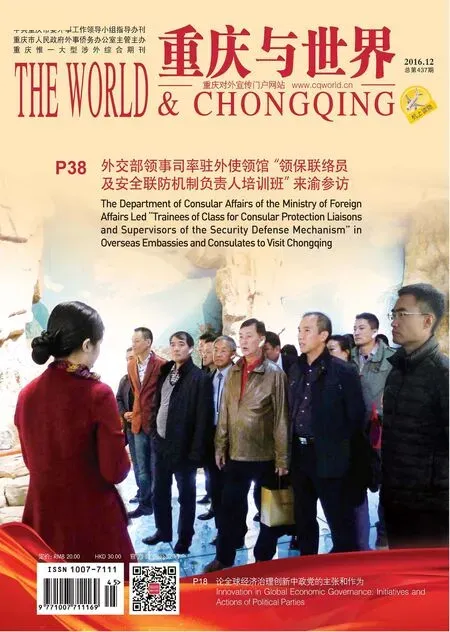经济学者圆桌会议 深入探讨重大话题
经济学者圆桌会议 深入探讨重大话题
在由中外经济学者和商界代表参加的“经济学者圆桌会议”上,来自各国的嘉宾学者围绕“全球经济治理与中国发展”“全球经济治理与中国贡献”“后杭州G20时代的中国角色”等话题发表了各自的观点,并就全球面临的机遇与挑战进行了深入讨论,热烈的讨论从上午9点一直持续到中午,最后以全国工商联专职副主席、北京大学国家发展研究院名誉院长林毅夫的精彩总结宣告“经济学者圆桌会议”圆满结束。重庆市副市长刘桂平出席会议并发言。
林毅夫表示,作为发展中国家,中国在经济治理方面推行渐进的双轨制度,却有一些值得发达国家借鉴的经验,“中国经济的发展是人类经济史上的奇迹,在1978年改革开放以前,中国人均GDP达不到非洲国家平均数的三分之一,改革开放38年以来,中国以平均每年9.7%在增长,平均每年贸易增长速度为15%。2000年以前,全世界经济主要贡献来自于美国,来自于发达国家,从2000年以后,中国经济对全世界市场贡献不断增长,2000年来,中国经济对全世界经济贡献超过30%,与其他发展中国家加起来,对全世界经济增长贡献超过三分之二,全球经济治理结构有必要按照经济比重的变化重新来调整。”
新加坡政府文化、社区及青年部兼贸工部高级政务部长沈颖在会上表示,“一带一路”倡议,以及亚投行都能很好地反映中国融入区域和世界经济的决心,有很多中国企业在东南亚以及整个全球拓展他们的业务,中国和新加坡企业在东盟之间建立了更多更重要的伙伴关系,人民币的国际化也会颠覆重塑亚洲的商业模式,在未来的10年,中国人民币加入了国际货币特别取款权篮子,也是中国国际化历程重要一步。“新加坡是世界上第三大人民币的离岸市场,中国和新加坡在货币方面的合作大有可为。中国作为新兴经济体,中国将如何继续深度和世界融入?对中国和亚洲市场来说非常重要。”

经济学者圆桌会议现场。 摄影:陶代明
Economists Round Table: An In-depth Discussion of Major Issues
The Economists Round Table gathered together economists and entrepreneurs from China and other countries. With “Global Economic Governance and Development in China”, “Global Economic Governance and China’s Contribution” and “China’s Role in the Era after G20 Hangzhou Summit” as the themes, all the participants aired their opinions and made an in-depth discussion on the opportunities and challenges that the world is now facing. The 3-hour discussion was heated indeed, starting from 9:00 a.m. and lasting for the whole morning. It was concluded by the insightful comment of Lin Yifu, former senior vice president of the World Bank, deputy chairman of All-China Federation of Industry and Commerce, and professor of Peking University. Liu Guiping, vice mayor of Chongqing Municipal People’s Government, also attended the roundtable and delivered a speech.
As a developing country adopting a gradual double-way system in economic governance, China has offered some experience that can be learned by developing countries, Lin said. “China’s economic development is a miracle in the economic history of human beings. Before 1978 when China adopted the reforming and opening-up policy towards the outside world, the GDP per capita in China was less than one third of the average level in African countries. The 38 years since China’s reforming and opening-up has witnessed an annual GDP increase of 9.7% and an average increase of 15% in trade. Before the year 2000, America and other developed countries were the major contributors of world economic growth but the years afterward have witnessed an increasing contribution of China towards world economic growth. Since then, China has contributed to 30% of world economy. If we take other developing countries into consideration, the contribution of China and these developing countries has amounted to two thirds of world economy. Therefore, the structure of global economic governance should be readjusted in accordance with the changes in the proportions of economic contribution,” said Lin.
Sim Ann, senior minister of state, Ministry of Culture, Community and Youth & Ministry of Trade and Industry, Singapore, said that the Belt and Road Initiative and Asian Infrastructure Investment Bank (AIIB) reflect China’s determination to play a part in regional and world economy. More and more Chinese enterprises are expanding their business in Southeast Asia and the rest of the world. Chinese and Singaporean enterprises have established more and more important partnership in ASEAN countries, and the internationalization of Chinese yuan will reshape the business model in Asia. In the 10 years to come, the Chinese currency is to be included in the basket of currencies which make up the IMF’s Special Drawing Right, or SDR. “This is an important step of China’s internationalization. In terms of currency cooperation, there is much to expect between China and Singapore, the third largest offshore market of Chinese yuan. As an emerging economy, how will China integrate with the world in an in-depth way? This is extremely important both for China and the Asian market,” said Sim.

A view of the Economists Round Table Picture by Hu Rui

